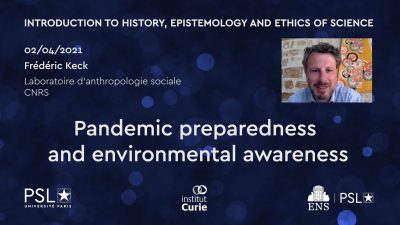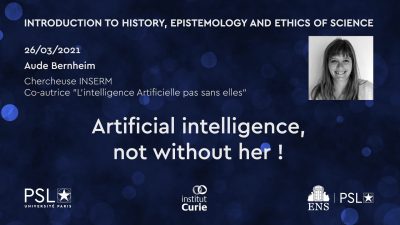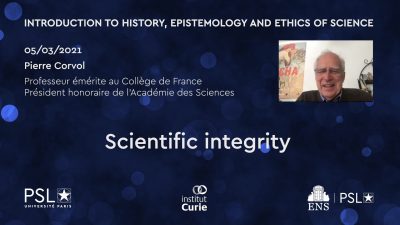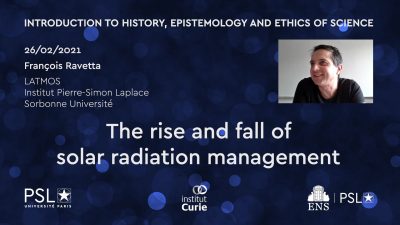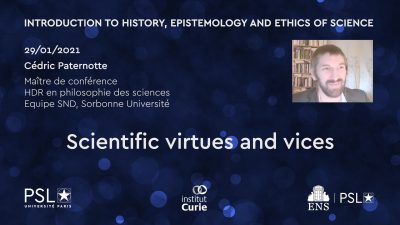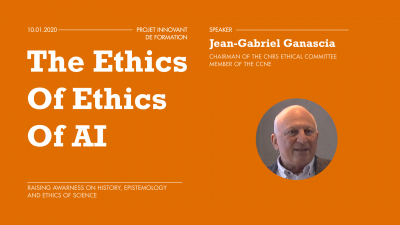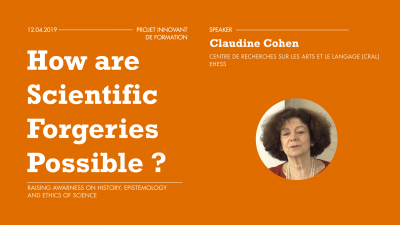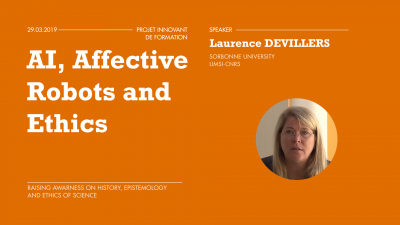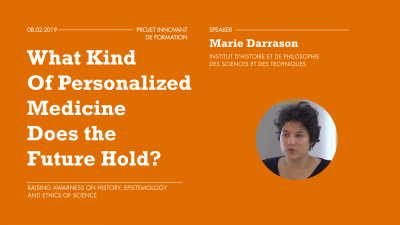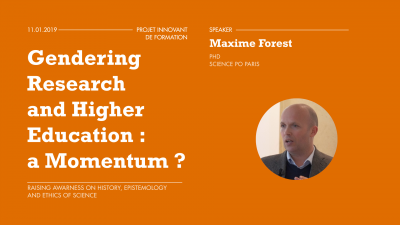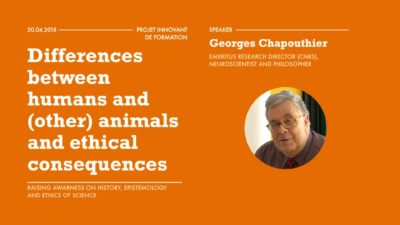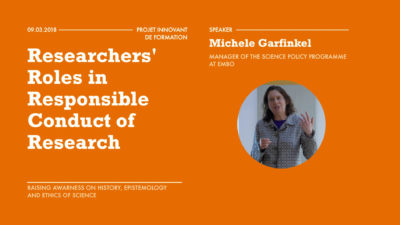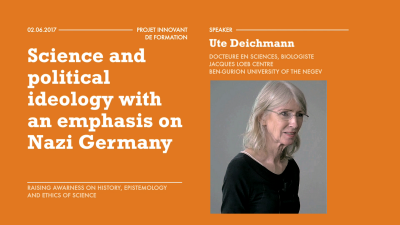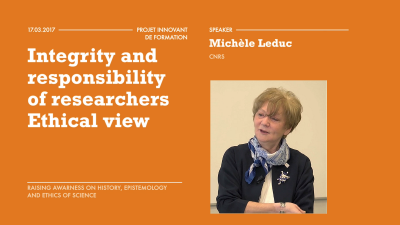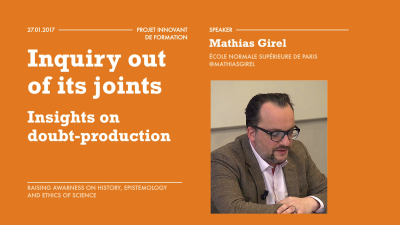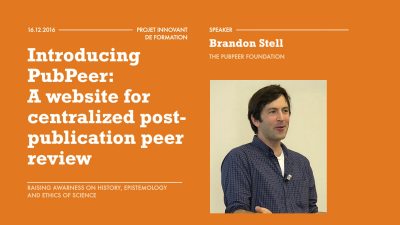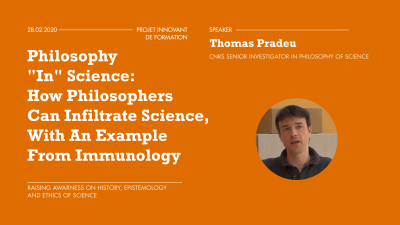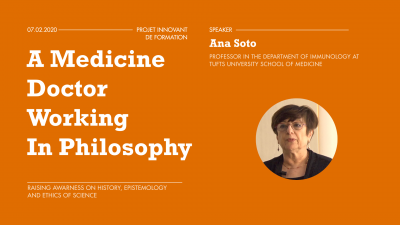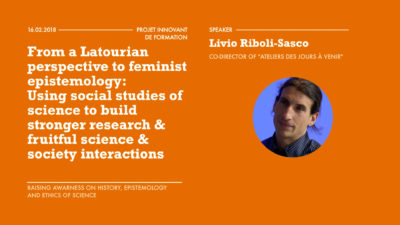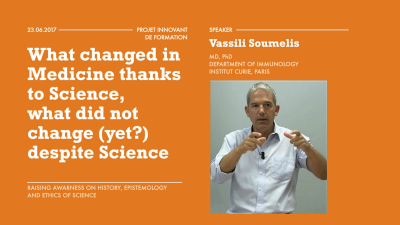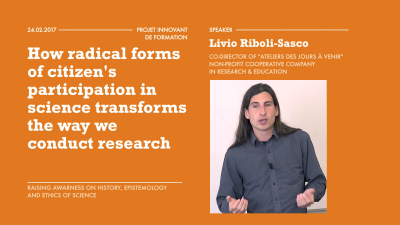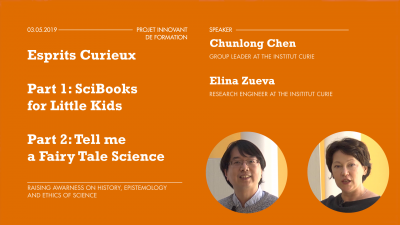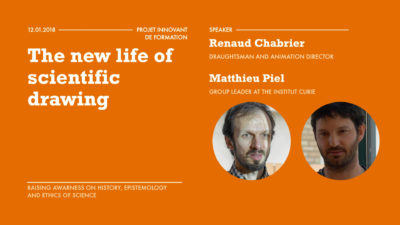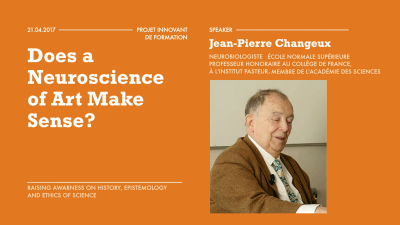Cette formation, portée par l’Institut Curie et l’École normale supérieure – PSL, associant réflexion philosophique, études historiques et discussions sur les enjeux éthiques de la connaissance scientifique, est devenue indispensable à toutes celles et tous ceux qui travailleront demain en recherche ou, plus généralement, dans tous les métiers qui lui sont liés. Elle leur permettra non seulement d’améliorer leur démarche de chercheur mais aussi de développer une conscience citoyenne sur ces questions, et d’être mieux préparés au dialogue avec la Société.
Présentation par thèmes
Pandemic preparedness and environmental awareness
Epistémologie, Ethique, Sensibilisation à l’Histoire, l’Épistémologie et l’Éthique des sciences - 2021
02.04.202153:10
While preparedness asks us to prepare for future pandemics, and question how much we are prepared in the organization of public health, it also includes attentiveness to environmental changes as early warning signals of pandemics. We’ll see 3 technics of preparedness : sentinel, desktop simulation and stockpiling.
Artificial intelligence, not without her!
Epistémologie, Ethique, Sensibilisation à l’Histoire, l’Épistémologie et l’Éthique des sciences - 2021
26.03.202152:29
Algorithms are macho. This is a major problem. Indeed, AI, artificial intelligence, is more and more present in our daily lives, without us always being aware of it. Virtual assistants, search engines, career guidance applications... select, suggest, orient, propagating sexist prejudices. How to remedy it? What could be the solutions ? A. Bernheim, proposes to use AI as an ally to counter gender and racist bias.
Scientific integrity
Epistémologie, Ethique, Sensibilisation à l’Histoire, l’Épistémologie et l’Éthique des sciences - 2021
05.03.202133:28
Scientific integrity is different from ethics and ensures the impartiality of research. A range of scientific misconduct from lack of knowledge to fraud has been identified. To address misconduct, it is important to obtain more data on frequency and to develop strategies for scientific integrity at the individual and collective levels
The rise and fall of solar radiation management
Epistémologie, Ethique, Sensibilisation à l’Histoire, l’Épistémologie et l’Éthique des sciences - 2021
26.02.202101:10:05
The seminar address the question of the use of geo-engineering to mitigate climate change, through the example of solar radiation management. How scientists are facing this current topic with some ethical issues? What is solar radiation management? What are the scientific and ethical issues of these technics?
Scientific virtues and vices
Epistémologie, Ethique, Sensibilisation à l’Histoire, l’Épistémologie et l’Éthique des sciences - 2021
29.01.202148:33
Are intellectual virtues useful for the successful resolution of theory choice, and what is their exact role in scientific activity? After listing a variety of scientifically relevant virtues and vices, C. Paternotte argues that virtues are neither necessary nor sufficient for successful theory choice. However, they can have a positive effect by accelerating the convergence of a scientific community toward a good theory.
The Ethics of Ethics of AI
Ethique, Sensibilisation à l’Histoire, l’Épistémologie et l’Éthique des sciences – 2020
10.01.20201:25:20
Can ethical committees enact sets of norms to prevent the unethical use of AI technologies? Jean-Gabriel Ganascia starts his lecture on ethics and AI by recalling the origins of the scientific discipline as well as the different definitions of the term « artificial intelligence ». He then provides examples of the unethical use of AI in different situation, for instance with autonomous cars or intelligent agents. Through descriptions of ethical dilemmas that may occur when implementing AI technologies, Ganascia characterizes the specifics of ethics in the digital era. He concludes his lecture by mentioning a scientific paper he wrote with Thomas Powers about the ethics of ethics of AI. According to him, the risk of having unethical AI does not come from the technology itself that would take its autonomy, but from the men behind the technology.
How are Scientific Forgeries Possible?
Epistémologie, Ethique, Histoire des sciences, Sensibilisation à l’Histoire, l’Épistémologie et l’Éthique des sciences - 2019
12.04.20191:00:05
Are forgers in science betrayers of truth, or do they show how science is built? Following a brief definition of forgery, Claudine Cohen emphasizes the questions and goals she addresses in her lecture. She first approaches forgery through the lens of ethics and questions the efficiency of moralizing scientific research. She then recalls that scientific knowledge is a construction of facts, just like forgery is. She does however insist on the intentional aspect of forgery to produce false evidence and conclusions. Cohen ultimately analyses the processes and methods of historical sciences, such as archeology and paleontology, and gives examples of two famous archeological forgeries: the forgery of Moulin Quignon and the forgery of the Piltdown man.
AI, Affective Robots and Ethics
Ethique, Sensibilisation à l’Histoire, l’Épistémologie et l’Éthique des sciences - 2019
29.03.20191:15:41
Is artificial intelligence (AI) developed according to ethical principles? After presenting herself as well as her research center, Laurence Devillers defines AI and explains how it works. She also presents the risks of the lack of women in the AI industry. She then gives a brief summary of AI historical development while focusing on the specificities of contemporary AI. To show the current limits of AI, Devillers enumerates the differences between machine intelligence and human intelligence. She insists on the fact that the ability for electronic systems to fake emotions can deceive vulnerable people. She then lists a series of ethical principles that should be respected by AI industry leaders. As a conclusion to her lecture, Devillers claims that there are no ethical machines. Ethics should come from the community of researchers and industries by building common AI tools.
What Kind of Personalized Medicine Does the Future Hold?
Epistémologie, Ethique, Sensibilisation à l’Histoire, l’Épistémologie et l’Éthique des sciences - 2019
08.02.20191:08:46
Is personalized medicine as successful as we think? This is the question Marie Darrason considers in her lecture. She first gives a definition of personalized medicine before explaining its origins, its goals and its values. Darrason then examines the pros and cons behind the use of personalized medicine in health care. She emphasizes the fact that prediction and big data are challenging. She uses the example of targeted therapies for curing cancer to support her demonstration. She also explores the concept of personalized medicine from an institutional perspective, especially with the project France Genomique 2025. Darrason concludes her lecture by underlining the need of more education for researchers, doctors and patients to brighten the future of medicine.
Gendering Research and Higher Education: a Momentum?
Epistémologie, Ethique, Sensibilisation à l’Histoire, l’Épistémologie et l’Éthique des sciences - 2019
11.01.20191:23:00
What are the gender issues in research and how can we overcome them? In his lecture, Maxime Forest starts by revealing the fundamental gender problems in science: horizontal and vertical segregation between men and women. He then explains the reasons behind these problems. The masculine image of science, gender blindness and gender bias all prevent women from performing as well as men in research. Forest continues his presentation by summarizing some European policies promoting gender equality in research. He speaks about the European Commission’s strategy behind these policies and enumerates some of their successes. He concludes by detailing the Egera experiment, a project conducted by Sciences Po Paris attempting to establish equality between men and women in academia.
From Ethics of Robotics to Ethics of Robots
Ethique, Sensibilisation à l’Histoire, l’Épistémologie et l’Éthique des sciences - 2018
08.06.20181:01:16
What should the ethics be for robotics? Dominique Lambert starts his lecture by summarizing the legal and ethical problems facing human society with the development of autonomous systems. After having given a definition for robots and robotics, Lambert continues with the description of the different types of interactions between humans and machines. He then evokes essays and laws on robotics and recalls some of the philosophical points of view on responsibility. As a conclusion, Lambert proposes an ethical guideline for the future development of robotics.
Differences between humans and (other) animals and ethical consequences
Ethique, Histoire des sciences, Sensibilisation à l’Histoire, l’Épistémologie et l’Éthique des sciences - 2018
20.04.20181:04:50
Are human beings like any other animals? This is the question Georges Chapouthier answers by showing the thin limits between animality and humanity. Chapouthier starts his lecture by summarizing the human point of view on animals throughout history, and then recalls the similarities between human beings and animals, culture-wise and intelligence-wise. To prove his point, he gives numerous examples of elephants, monkeys, dolphins and birds that demonstrate their culture and intelligence. Chapouthier ends his presentation by listing the characteristics that make human beings different from animals among which are the concept of duration, the use of imagination, and the importance of neoteny.
Researchers’ Roles in Responsible Conduct of Research
Ethique, Sensibilisation à l’Histoire, l’Épistémologie et l’Éthique des sciences - 2018
09.03.20181:21:50
Why and how do scientists have to be responsible? Michele Garfinkel starts her lecture by presenting the scientific organization she is working for, EMBO. She first describes the “Science Policy Programme” developed at EMBO that examines concerns emerging from advances in scientific research, and then explains that the program helps strengthen research integrity by underlining conflicts of interest. Garfinkel defines what a conflict of interest is before giving examples of such conflicts. She finishes her lecture by talking about the scientific publishing system at EMBO, developing a few examples about accepted or refused scientific papers, and describing new approaches to improve scientific responsibilities.
Science and political ideology with an emphasis on Nazi Germany
Ethique, Histoire des sciences, Sensibilisation à l’Histoire, l’Épistémologie et l’Éthique des sciences - 2017
02.06.20171:28:15
What was the predominant scientific and political ideology in Nazi Germany? How was science conducted under Hitler? Are German scientists responsible for the Holocaust? In her lecture, Ute Deichmann answers these questions in detail. She begins her talk by recalling the definition of ideology and explaining it in the context of Nazi Germany. She then talks about the eviction of Jewish scientists under Hitler and the ideological transformation of science in universities and laboratories at the time. She tells the audience about the specific topic of race hygiene and euthanasia in Nazi Germany before finishing her talk by explaining the Nazi viewpoint on ecology and environmental medicine.
Integrity and responsibility of researchers Ethical view
Ethique, Sensibilisation à l’Histoire, l’Épistémologie et l’Éthique des sciences - 2017
17.03.20171:39:48
Who tracks fraud and misconduct? How do scientific communities prevent scientists from falsifying their research? In her lecture, Michèle Leduc starts by introducing COMETS, the French scientific ethical committee she works for. She then talks about the necessity of integrity in science, and lists several examples of misconduct that have been observed amongst scientists. Leduc mentions different ways to prevent such misbehaviors, naming ethical committees, self-examination and control websites. She talks at length about the case of Olivier Voinnet and the consequences of his actions. She concludes her lecture by calling for the responsibility of scientists in their research.
Inquiry out of its joints – Insights on doubt-production
Epistémologie, Ethique, Sensibilisation à l’Histoire, l’Épistémologie et l’Éthique des sciences - 2017
27.01.20171:08:54
How to face doubt-mongers? Can we use what we know of antic skepticism to defeat them? In his lecture “Insights on doubt-production”, Mathias Girel introduces his topic with 4 examples of eye-opening books. He then describes the different techniques doubt-mongers use to weaken scientific findings, and he discloses their strategy to make people believe their arguments. However, Girel explains, understanding of Greek skepticism can help defeat doubt-mongers by debunking their flimsy arguments. He then warns the audience about the risks of always doubting scientific findings and finishes his lecture by giving some tips to help science endure.
Introducing PubPeer : A website for centralized post-publication peer review
Ethique, Sensibilisation à l’Histoire, l’Épistémologie et l’Éthique des sciences - 2017
16.12.201636:33
Can we reduce the flaws in research thanks to a new kind of assessments on papers by the scientific community? In his lecture, Brandon Stell presents PubPeer, the website for centralized post-publication peer review he created in 2012. Inspired by journal club conversations, PubPeer enables scientists to discuss any publication in any field. This platform, Stell says, consequently reduces flaws in research by allowing open discussions and cross-examinations of the material. He then explains how the platform works: how to create an account, how to post comments about an article and how to answer them. He concludes his lecture by announcing the future developments for the platform in order to improve its efficiency.
Pandemic preparedness and environmental awareness
Epistémologie, Ethique, Sensibilisation à l’Histoire, l’Épistémologie et l’Éthique des sciences - 2021
02.04.202153:10
While preparedness asks us to prepare for future pandemics, and question how much we are prepared in the organization of public health, it also includes attentiveness to environmental changes as early warning signals of pandemics. We’ll see 3 technics of preparedness : sentinel, desktop simulation and stockpiling.
Artificial intelligence, not without her!
Epistémologie, Ethique, Sensibilisation à l’Histoire, l’Épistémologie et l’Éthique des sciences - 2021
26.03.202152:29
Algorithms are macho. This is a major problem. Indeed, AI, artificial intelligence, is more and more present in our daily lives, without us always being aware of it. Virtual assistants, search engines, career guidance applications... select, suggest, orient, propagating sexist prejudices. How to remedy it? What could be the solutions ? A. Bernheim, proposes to use AI as an ally to counter gender and racist bias.
Scientific integrity
Epistémologie, Ethique, Sensibilisation à l’Histoire, l’Épistémologie et l’Éthique des sciences - 2021
05.03.202133:28
Scientific integrity is different from ethics and ensures the impartiality of research. A range of scientific misconduct from lack of knowledge to fraud has been identified. To address misconduct, it is important to obtain more data on frequency and to develop strategies for scientific integrity at the individual and collective levels
The rise and fall of solar radiation management
Epistémologie, Ethique, Sensibilisation à l’Histoire, l’Épistémologie et l’Éthique des sciences - 2021
26.02.202101:10:05
The seminar address the question of the use of geo-engineering to mitigate climate change, through the example of solar radiation management. How scientists are facing this current topic with some ethical issues? What is solar radiation management? What are the scientific and ethical issues of these technics?
Scientific virtues and vices
Epistémologie, Ethique, Sensibilisation à l’Histoire, l’Épistémologie et l’Éthique des sciences - 2021
29.01.202148:33
Are intellectual virtues useful for the successful resolution of theory choice, and what is their exact role in scientific activity? After listing a variety of scientifically relevant virtues and vices, C. Paternotte argues that virtues are neither necessary nor sufficient for successful theory choice. However, they can have a positive effect by accelerating the convergence of a scientific community toward a good theory.
Philosophy « In » Science: How Philosophers Can Infiltrate Science, With An Example From Immunology
Epistémologie, Sensibilisation à l’Histoire, l’Épistémologie et l’Éthique des sciences – 2020
28.02.20201:05:08
How can philosophy help science? In the introduction to his lecture, Pradeu insists on the relevance of associating philosophy and science, especially philosophy and immunology. He then explains his personal approach to philosophy in science by showing a study on bibliometrics and reporting on an analysis of pins. Following a presentation of the ImmunoConcEpT laboratory and its team, Pradeu summarizes his thinking about immunology and individuality. According to Pradeu’s discontinuity theory, organisms are microbial communities, which means that individuals are not homogeneous, but heterogeneous. Pradeu concludes his lecture by presenting two therapeutic consequences of his theory: the shifting view on immune response in cancer and the development of an “ecosystemic” medicine.
A medicine doctor working in philosophy
Epistémologie, Sensibilisation à l’Histoire, l’Épistémologie et l’Éthique des sciences – 2020
07.02.20201:05:01
How does theory impact scientific research? In order to address this question, Ana Soto explains different ways in which her knowledge of philosophy nourishes her experimental work in biology. She especially insists on the need of theory to choose observables. After presenting the ORGANISM Group and its research, Soto discusses her theory of organisms and its three main principles: default state, variation and organization. To provide examples to her audience, she focusses on her experiments on organogenesis and on carcinogenesis. She ends her talk by sharing the conclusions of these experiments.
How are Scientific Forgeries Possible?
Epistémologie, Ethique, Histoire des sciences, Sensibilisation à l’Histoire, l’Épistémologie et l’Éthique des sciences - 2019
12.04.20191:00:05
Are forgers in science betrayers of truth, or do they show how science is built? Following a brief definition of forgery, Claudine Cohen emphasizes the questions and goals she addresses in her lecture. She first approaches forgery through the lens of ethics and questions the efficiency of moralizing scientific research. She then recalls that scientific knowledge is a construction of facts, just like forgery is. She does however insist on the intentional aspect of forgery to produce false evidence and conclusions. Cohen ultimately analyses the processes and methods of historical sciences, such as archeology and paleontology, and gives examples of two famous archeological forgeries: the forgery of Moulin Quignon and the forgery of the Piltdown man.
Why do humans reason?
Epistémologie, Sensibilisation à l’Histoire, l’Épistémologie et l’Éthique des sciences - 2019
15.03.20190:36:13
What does reason help humans do? Hugo Mercier starts his lecture by explaining how reason differs from intuition. He then defines the theory of the individualistic view of reasoning and cites René Descartes and Daniel Kahneman as its defendants. Mercier continues by giving an example of a reasoning test to show that reason is not accurate but helps humans in social interactions. To conclude his demonstration, Mercier enumerates a series of predictions about the human ability to reason. First, reason has a myside bias. Second, it shows selective laziness. Third, it enables better evaluation of arguments. The fourth prediction is a consequence of the first three ones: people tend to evaluate arguments more accurately when in a group than alone.
What Kind of Personalized Medicine Does the Future Hold?
Epistémologie, Ethique, Sensibilisation à l’Histoire, l’Épistémologie et l’Éthique des sciences - 2019
08.02.20191:08:46
Is personalized medicine as successful as we think? This is the question Marie Darrason considers in her lecture. She first gives a definition of personalized medicine before explaining its origins, its goals and its values. Darrason then examines the pros and cons behind the use of personalized medicine in health care. She emphasizes the fact that prediction and big data are challenging. She uses the example of targeted therapies for curing cancer to support her demonstration. She also explores the concept of personalized medicine from an institutional perspective, especially with the project France Genomique 2025. Darrason concludes her lecture by underlining the need of more education for researchers, doctors and patients to brighten the future of medicine.
Gendering Research and Higher Education: a Momentum?
Epistémologie, Ethique, Sensibilisation à l’Histoire, l’Épistémologie et l’Éthique des sciences - 2019
11.01.20191:23:00
What are the gender issues in research and how can we overcome them? In his lecture, Maxime Forest starts by revealing the fundamental gender problems in science: horizontal and vertical segregation between men and women. He then explains the reasons behind these problems. The masculine image of science, gender blindness and gender bias all prevent women from performing as well as men in research. Forest continues his presentation by summarizing some European policies promoting gender equality in research. He speaks about the European Commission’s strategy behind these policies and enumerates some of their successes. He concludes by detailing the Egera experiment, a project conducted by Sciences Po Paris attempting to establish equality between men and women in academia.
From a Latourian perspective to feminist epistemology: Using social studies of science to build stronger research & fruitful science & society interactions
Epistémologie, Sensibilisation à l’Histoire, l’Épistémologie et l’Éthique des sciences - 2018
16.02.20181:10:29
How can sociology and anthropology help science to improve? This is the question Livio Riboli-Sasco discusses in his lecture. He starts by explaining Merton’s scientific values of universalism, communism, disinterestedness and organized skepticism. He also underlines the cultural rituals of research in laboratories. He then shows how scientists’ social backgrounds influence the research they do and the results they find. This observation leads him to stress the need for diversity of perspectives in science. At the end of his lecture, Livio Riboli-Sasco develops examples of how to include laypersons in scientific research. He advocates for a slower process of research and asks for more time to consult with society.
What changed in Medicine thanks to Science, what did not change (yet?) despite Science
Epistémologie, Histoire des sciences, Sensibilisation à l’Histoire, l’Épistémologie et l’Éthique des sciences - 2017
23.06.20171:28:39
Does science help medicine to improve? Vassili Soumelis begins his lecture by surprisingly claiming that medicine is not a scientific activity but an empirical art. However, he says, science has helped medicine become more efficient throughout history, especially statistics, chemistry and biology. For each of these sciences, Soumelis exposes examples where medicine improved thanks to scientific knowledge. He concludes his presentation with the historical example of tobacco, first developed as a therapeutic substance and later considered as dangerous to one’s health.
How radical forms of citizen’s participation in science transforms the way we conduct research
Epistémologie, Sensibilisation à l’Histoire, l’Épistémologie et l’Éthique des sciences - 2017
24.02.201751:56
How are we producing knowledge? What changes when scientists work with citizens? In his lecture, Livio Riboli-Sasco explains how citizens’ participation in science transforms the way scientists conduct research. He uses many examples of research projects in which citizens are closely involved to show that citizens are legitimate in raising scientific questions. They bring objectivity to science, he says, and help scientists deepen their understanding of natural and human mechanisms. Riboli-Sasco ends his talk by enumerating obstacles he has faced when working on projects with citizens: the lack of funding, the institutional pressure on researchers, and the difficulty to find mediators.
Inquiry out of its joints – Insights on doubt-production
Epistémologie, Ethique, Sensibilisation à l’Histoire, l’Épistémologie et l’Éthique des sciences - 2017
27.01.20171:08:54
How to face doubt-mongers? Can we use what we know of antic skepticism to defeat them? In his lecture “Insights on doubt-production”, Mathias Girel introduces his topic with 4 examples of eye-opening books. He then describes the different techniques doubt-mongers use to weaken scientific findings, and he discloses their strategy to make people believe their arguments. However, Girel explains, understanding of Greek skepticism can help defeat doubt-mongers by debunking their flimsy arguments. He then warns the audience about the risks of always doubting scientific findings and finishes his lecture by giving some tips to help science endure.
Esprits Curieux
Art et sciences, Sensibilisation à l’Histoire, l’Épistémologie et l’Éthique des sciences - 2019
03.05.20190:29:54
How to explain science to young children? By publishing books for two-to-six-year-old kids on scientific topics, the Actine Association, created by Olga Markova, aims to make science approachable to anyone. The project is called Esprits Curieux. The association is also involved in facilitating workshops for children and curating exhibitions for the general public on biological processes. During their lecture, Chunlong Chen and Elina Zueva share the stage to present the two books they each have written. Chen’s book is about the role of platelets in the blood while Zueva’s book tells the story of the relationship between the genome and transposons. They comment on their approach to storytelling for children by explaining their choice of topic, telling their story and showing the illustrations of each book.
The new life of scientific drawing
Art et sciences, Histoire des sciences, Sensibilisation à l’Histoire, l’Épistémologie et l’Éthique des sciences - 2018
12.01.20181:17:58
How can drawing make science easier to understand? Renaud Chabrier starts the lecture with an overview on the relationship between science and drawing throughout history. He exposes a variety of examples including Lorenzetti’s painting, Da Vinci’s drawings and Bosch’s sketches. Matthieu Piel then sums up the main steps of his research on cell migration. He expounds on the “Migrate with cells” project he has developed with Renaud Chabrier. He also talks about his collaboration with Ana-Maria Lennon-Duménil and the movie he has made for the American Society for Cell Biology. The lecture ends with a presentation of Globule, an illustrated book that makes cell biology accessible to the general public.
Does a Neuroscience of Art Make Sense ?
Art et sciences, Sensibilisation à l’Histoire, l’Épistémologie et l’Éthique des sciences - 2017
21.04.20171:14:56
Does a neuroscience of art make sense? To answer this question, Jean-Pierre Changeux begins his lecture by giving a definition of art and aesthetics. He then explains how the human brain works from a neurologist’s point of view, and details its evolution throughout prehistory. Changeux’s goal is to demonstrate the link between art and cognitive conscience. To do so, he shows the audience how cultural experiences make the brain react. Genes, he says, are 100% responsible for neural development. And so are aesthetic experiences, he ads with humor. Changeux finishes his lecture by claiming that rules exist in art, and he even gives examples of these rules: novelty, surprise, and parsimony.
How are Scientific Forgeries Possible?
Epistémologie, Ethique, Histoire des sciences, Sensibilisation à l’Histoire, l’Épistémologie et l’Éthique des sciences - 2019
12.04.20191:00:05
Are forgers in science betrayers of truth, or do they show how science is built? Following a brief definition of forgery, Claudine Cohen emphasizes the questions and goals she addresses in her lecture. She first approaches forgery through the lens of ethics and questions the efficiency of moralizing scientific research. She then recalls that scientific knowledge is a construction of facts, just like forgery is. She does however insist on the intentional aspect of forgery to produce false evidence and conclusions. Cohen ultimately analyses the processes and methods of historical sciences, such as archeology and paleontology, and gives examples of two famous archeological forgeries: the forgery of Moulin Quignon and the forgery of the Piltdown man.
Differences between humans and (other) animals and ethical consequences
Ethique, Histoire des sciences, Sensibilisation à l’Histoire, l’Épistémologie et l’Éthique des sciences - 2018
20.04.20181:04:50
Are human beings like any other animals? This is the question Georges Chapouthier answers by showing the thin limits between animality and humanity. Chapouthier starts his lecture by summarizing the human point of view on animals throughout history, and then recalls the similarities between human beings and animals, culture-wise and intelligence-wise. To prove his point, he gives numerous examples of elephants, monkeys, dolphins and birds that demonstrate their culture and intelligence. Chapouthier ends his presentation by listing the characteristics that make human beings different from animals among which are the concept of duration, the use of imagination, and the importance of neoteny.
The new life of scientific drawing
Art et sciences, Histoire des sciences, Sensibilisation à l’Histoire, l’Épistémologie et l’Éthique des sciences - 2018
12.01.20181:17:58
How can drawing make science easier to understand? Renaud Chabrier starts the lecture with an overview on the relationship between science and drawing throughout history. He exposes a variety of examples including Lorenzetti’s painting, Da Vinci’s drawings and Bosch’s sketches. Matthieu Piel then sums up the main steps of his research on cell migration. He expounds on the “Migrate with cells” project he has developed with Renaud Chabrier. He also talks about his collaboration with Ana-Maria Lennon-Duménil and the movie he has made for the American Society for Cell Biology. The lecture ends with a presentation of Globule, an illustrated book that makes cell biology accessible to the general public.
What changed in Medicine thanks to Science, what did not change (yet?) despite Science
Epistémologie, Histoire des sciences, Sensibilisation à l’Histoire, l’Épistémologie et l’Éthique des sciences - 2017
23.06.20171:28:39
Does science help medicine to improve? Vassili Soumelis begins his lecture by surprisingly claiming that medicine is not a scientific activity but an empirical art. However, he says, science has helped medicine become more efficient throughout history, especially statistics, chemistry and biology. For each of these sciences, Soumelis exposes examples where medicine improved thanks to scientific knowledge. He concludes his presentation with the historical example of tobacco, first developed as a therapeutic substance and later considered as dangerous to one’s health.
Science and political ideology with an emphasis on Nazi Germany
Ethique, Histoire des sciences, Sensibilisation à l’Histoire, l’Épistémologie et l’Éthique des sciences - 2017
02.06.20171:28:15
What was the predominant scientific and political ideology in Nazi Germany? How was science conducted under Hitler? Are German scientists responsible for the Holocaust? In her lecture, Ute Deichmann answers these questions in detail. She begins her talk by recalling the definition of ideology and explaining it in the context of Nazi Germany. She then talks about the eviction of Jewish scientists under Hitler and the ideological transformation of science in universities and laboratories at the time. She tells the audience about the specific topic of race hygiene and euthanasia in Nazi Germany before finishing her talk by explaining the Nazi viewpoint on ecology and environmental medicine.
 UNIVERSITÉ PSL
UNIVERSITÉ PSL



